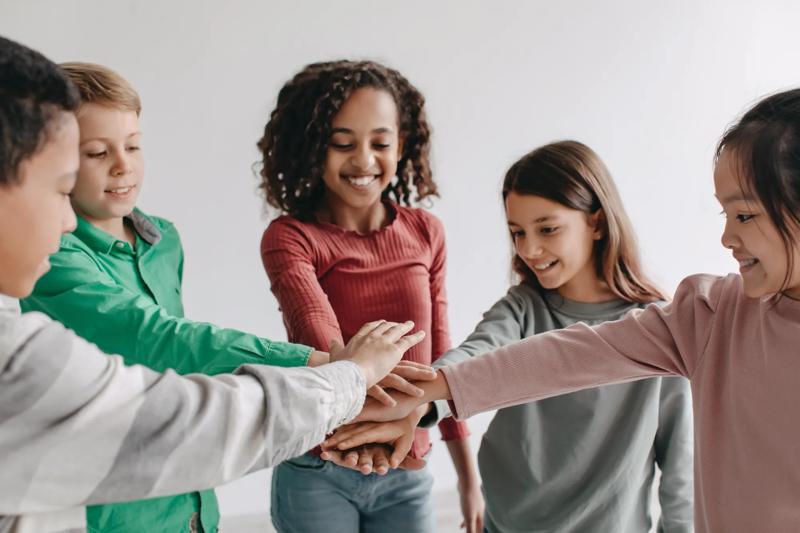Teachers sometimes reject the concept of global citizenship because it seems far remote from their students' everyday lives. Some argue that because there is no system of global governance, teaching for global citizenship is irrelevant at best. Others believe it distracts from the more immediate challenges of persuading youth to engage with local and national issues and to practice democracy at school, in the local community, and in their own nation.
But teachers don't have to choose between local and national issues on one hand and global concerns on the other. We need to prepare young people for interdependence and diversity at all scales: in the school community, neighborhood, town or city, nation, and globe. This is what I refer to as education for cosmopolitan citizenship (Osler & Starkey, 2003, 2005). This citizenship learning draws on David Held's (1997) concept of cosmopolitan democracy, which recognizes our complex, interconnected world. It draws on the social and political movements from the 1960s onward that have challenged the nature of power and democracy—not just at the nation-state level but also at work, in the community, and in our personal lives.
Citizens today need more than formal access to the public sphere and to decision-making processes. They also need to understand the complex ways in which they can claim (or be denied) access to public resources and acquire the know-how to engage in political processes. When people feel excluded from these processes, they lose trust in elected representatives and in the political class.
At the same time, the shape of political communities has shifted in response to forces of globalization. More than ever, we have an intensely connected global economy, highly integrated global financial systems, and multinational companies dominating national and international transactions. In environmental politics, human rights, international law and security, and social media, people feel more closely connected than ever before.
In this context, students need to understand the multifaceted patterns of economic factors, cultural processes, and social movements that shape their lives. Teachers must devise programs of study that help students acquire skills to engage in new and changing forms of politics.
Thanks to an Invited Research Fellowship awarded by the Japan Society for the Promotion of Science, I recently had the chance to meet teachers in Japan who were concerned about educating students for our global age and to compare their stories with those of teachers in Europe. I talked with the educators about their lives, their teaching experiences, and their hopes for their students. I draw here on two teachers' accounts to explore what education for cosmopolitan citizenship might look like.
VERONICA, a Citizenship Teacher in London
Veronica, an experienced educator of some 20 years, was teaching in a large high school in London. Born in London in the early 1960s to Ghanaian parents studying in the United Kingdom, she moved to Ghana as a small child when her parents wanted to make a contribution to their newly independent homeland. Veronica later returned to London in the 1980s as a young graduate. She worked several jobs before deciding to train as a teacher. Her own experiences of migration inform her approach to teaching courses in citizenship; religious education; and personal, social, and health education.
Over the last decade, Veronica's school has seen a substantial demographic change. The school originally served a predominately white British working class community. White British students remain the largest ethnic group, but the school now reflects the "super-diversity" (Vertovec, 2007) that characterizes London as a global city at the heart of the international economy. A growing number of Veronica's students are themselves migrants.
Veronica is a well-loved teacher ready to share her personal story with students, including the emotional challenges of leaving her country, family, and friends. She is able to empathize with students, many of whom have come to London with their families in search of a better life or as refugees fleeing conflict or repressive regimes. Veronica explains:
One reason I came back to the U.K. … was because of the poor economic situation in Ghana. I took advantage of the fact that, because I was born here and was therefore a British citizen, it was "easier" for us to come back to the U.K. I had to relinquish my Ghanaian citizenship because we were not allowed dual citizenship. We now can have dual citizenship. I always say that I am Ghanaian.
For Veronica, the concept of flexible citizenship (Ong, 1999) and a citizenship education that fosters flexible and multiple identities in education is not innovative but commonplace, rooted in her life experience.
Ethical Citizenship
Veronica has had to adapt to reconcile the disparity between her sons' experiences growing up in London and events and values that shaped her early life in Ghana. As she put it, "family experience influences how I do things in school."
When meeting new students, Veronica talks about her family background. "I tell them where I come from and that I'm interested in them," she says. "I tell them my parents were interested in people and ready to learn from different people and cultures."
This connection creates a constructive learning environment, not detracting from professional duties but enhancing them. Veronica listens carefully to students and sometimes seeks her sons' advice. In one instance, she told her sons about a student who frequently disrupted class. Having no success in correcting the student's behavior, she turned to her son for input. He said, "Look at him as an individual and find out what he likes."
Veronica noticed the student's clothes weren't clean and one day found him with his head on the table. When she asked if he was all right, the student told her that he hadn't eaten. "I thought, no wonder you can't work," Veronica said. "I gave him something to eat, and then I encouraged the children to share what they had."
Recognizing the negative impact of poverty on student achievement, Veronica sought a concrete, caring solution to the immediate problem—the child's hunger. She followed this with a pedagogical step, consistent with the human rights orientation of her classroom, encouraging her students (many of whom also experience hardship) to express solidarity by sharing food. In this way, she encouraged ethical citizenship.
Multiple Perspectives
Two topics are particularly relevant to Veronica's students: child rights and refugees. She believed that learning about the United Nations Convention on the Rights of the Child (1989) would be beneficial to her students, particularly many from sub-Saharan Africa. After learning about these rights, students made observations such as, "My mum needs to know … we have a right to privacy." With students' home contexts in mind, Veronica stressed the importance of young people knowing their rights but claiming them without undermining their parents.
Veronica believes that learning about refugees is particularly important for white British students who come across terms such as refugee, asylum seeker, and economic immigrants in the popular press (often carrying negative connotations). Her white students often speak about refugees in a critical way. She uses Refugee Week (recognized in the U.K. each June) to introduce students to the topic of refugees and asylum seekers. Her students develop media literacy skills, examining alternative perspectives to those that dominate the press and online spaces. In particular, students present alternative stories. The approach has had an effect on her students. After one of Veronica's white British students learned about his peers' migration experiences, he explained that he hadn't meant to express antagonism toward his classmates.
The curriculum links Veronica's students' diverse worlds to political and social developments in London, Europe, and beyond. Both her experiences and her students' experiences help present the human stories behind globalization.
Veronica is a role model of flexible citizenship and multiple belonging. She recognizes a political dimension to citizenship learning and teaches her students skills to recognize multiple perspectives and bias. Veronica is educating her students to be cosmopolitan citizens, able to recognize how they're connected with others, near and far.
MIN-JI, Teacher of Korean History and Culture in Osaka, Japan
I met Min-Ji at the Japanese middle school where she works in the Tsuruhashi neighborhood in Osaka, sometimes known as Korea Town. Tsuruhashi has one of Japan's largest concentrations of Koreans, the majority of whom are Zainichi Koreans, permanent residents whose families came to Japan in the first half of the 20th century, in an era when Japan ruled Korea.
Min-Ji's grandfather was brought as a forced laborer from Korea to northern Japan. Although "forced labor" sometimes implied kidnapping, her grandfather was compelled to leave Korea because the Japanese state had taken his land. After World War II, forced laborers were not offered transportation back to Korea. Yet, they were not eligible to claim Japanese citizenship.
Learning from the Past
Min-Ji's "ethnic classroom" is where students of Korean heritage (and sometimes "double" Korean-Japanese heritage) come once a week to learn about Korean history and culture, the basics of the Korean language, and the history of Koreans in Japan. Although Min-Ji's classes are not available to children of Japanese heritage, all 4th, 5th, and 6th graders at her school study Japanese and Korean history.
Min-Ji's principal explained that the Japanese government funds "ethnic classrooms" because it prefers that students of Korean heritage attend regular schools, rather than the alternative Korean community-run schools that exist in cities like Osaka. The principal hopes that these students will eventually work for greater cooperation across ethnic divides. More than 80 percent of students in his school are from minority ethnic backgrounds. He expressed his respect for Min-Ji's work, observing that in Japan, it is not easy to teach about the difficult past. Indeed, he studied Japan's history solely from a mainstream perspective when he was in school.
Becoming a Teacher
Min-Ji attended Kyoto University of Foreign Studies. She used a Japanese name until she completed high school to avoid discrimination. She quoted an old Korean saying that "changing your name is worse than being a dog," but pointed out that a Korean name makes it difficult to get a job, be admitted to a school, or even access forms of social security. It's a common practice for ethnic Koreans to adopt Japanese names; some use them simply for public purposes, reserving their Korean name for the family sphere.
At university, Min-Ji joined a Korean society and realized that some of her contemporaries could speak Korean; it wasn't simply a language spoken by the elderly! Her university experience proved a culture shock, but it also nurtured new ambitions: becoming a teacher, journalist, and novelist. She realized she wanted to foster young people's dreams. University gave her new insights into her social and political circumstances, and a desire for change. Today she belongs to an organization that regards national borders as unnecessary. Although some might consider this notion idealistic, it remains rooted in a cosmopolitan vision.
After graduation, Min-Ji wanted to volunteer to teach an ethnic Korean class; when she realized this was not permitted, she returned to university to get a teaching certificate. However, in 1982, an official ruling stated that foreign nationals could not become teachers, something that had a detrimental impact on the Korean community. At that time, Osaka employed just 18 ethnic Korean teachers. Within 10 years of the ruling, Osaka's teaching force became exclusively Japanese.
The ruling has since been relaxed as a result of decentralization policies, and Min-Ji was able to get her certificate. There are now 200 teachers of Korean nationality in the city. Min-Ji has a contract (rather than a permanent post) and is one of 11 "ethnic classroom" teachers across the prefecture. She is an active member of the Korean Teachers' Network, a group of teachers who meet regularly to support one another.
Direct and indirect discrimination continue, meaning that teachers with Korean nationality cannot be promoted beyond the basic grade. There remains a widespread belief among Korean nationals that it's impossible to become a teacher. Today it is possible to opt for naturalization, and some do. I asked Min-Ji whether she had considered this. She said she wished to retain her Korean nationality and be guaranteed equal rights. As she pointed out, she was born and grew up in Japan, pays taxes, and fulfills her duties—but is denied equal treatment before the law. Because Japan does not currently recognize dual nationality, I asked whether dual nationality might be an eventual solution. She believes this might work for children of double heritage.
Teaching for Justice
Min-Ji, like Veronica, recognizes a political and moral responsibility to her students. She seeks to ensure that they don't leave school believing it unlucky to be born an ethnic Korean in Japan, as she once did. This informs her teaching of Korean history and culture, and particularly her desire to provide her students with alternative perspectives on Japan's difficult past. She stresses the importance of developing her students' sense of independence and confidence in their identity. She critiques a prevailing viewpoint that suggests minorities need to be supported because they are weak or poor.
Min-Ji explained that students of Korean heritage don't feel like a minority in this school. They form 60 percent of the school population (30 percent are of solely Korean heritage and the other 30 percent have double Korean-Japanese heritage), and Japanese heritage students commonly see Korean songs as cool and are sometimes envious of their peers' Korean culture and history lessons. There is positive interaction across ethnic groups, with Japanese students becoming involved in cultural performances—something that doesn't happen in the other school where Min-Ji works (where there are fewer Korean students).
Min-Ji's teaching is informed by the discriminations she encounters. Yet it is an inspiring attempt to teach for justice within a democratic system that offers inadequate protection for minorities' rights.
Her teaching approach is not only culturally relevant, but, like Veronica's, it's also socially and politically attuned to her students' needs. More important, it fulfils two key aspects of education for cosmopolitan citizenship: It empowers students to gain skills to challenge inequality and injustice, and it offers alternative perspectives to the dominant national narrative.
Creating Cosmopolitan Citizens
Both Veronica and Min-Ji model cosmopolitan citizenship. While Veronica explicitly frames her teaching within an ethical framework of human rights, Min-Ji's approach is implicit. Both teachers recognize their students' potential to develop as cosmopolitan citizens and support young people using a variety of strategies. Although neither teacher works in an ideal context, their teaching prepares students to play an active role in their local communities and in an increasingly interconnected, fast-changing world.







